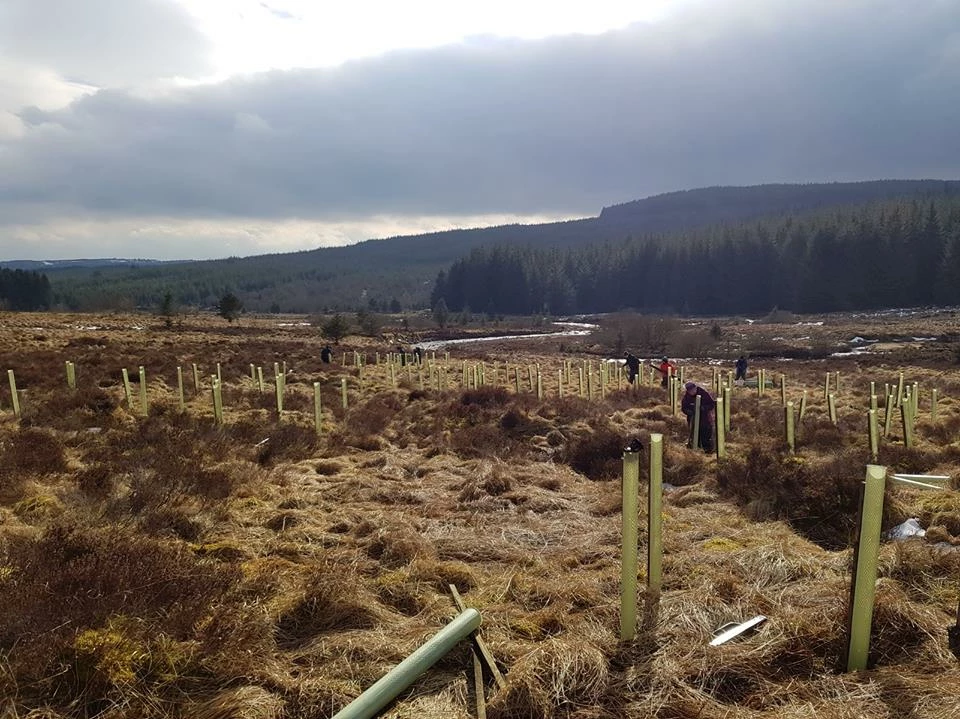
Member Article
Ready, steady, plant!
Northumberland Wildlife Trust’s ‘Kielder Wildwood’ partnership, which it manages in partnership with the Forestry Commission, has received a cash boost of £5,000 from the Community Foundation, as part of The Lawrence Campbell Community First Fund and Three Valleys’ Fund.
The five year project, which has been made possible thanks to National Lottery players via a grant from the National Lottery Heritage Fund, is working towards establishing a low density, native upland woodland on 100 hectares of open land along Scaup Burn at Kielderhead. The ‘Kielder Wildwood’ project is significant both locally and regionally, as native broadleaf woodland is so rare - there is less than 1% in Northumberland.
The project’s importance is immense as it will expand the population of what could be the only few remaining native English Scots Pines, referred to as William’s Cleugh pines, in the UK. The current population of trees is too small and ageing to allow a self-sustaining population to develop.
The ‘Kielder Wildwood’ project offers the project team the opportunity to restore a characteristic Native Upland Pine Woodland Habitat, unique to England, and which thrived in prehistoric times.
Fauna and flora biodiversity will be increased due to habitat diversification, as the woodland matures. Bird communities are expected to change favourably due to the enhancement of edge and scrub habitats, which will favour upland bird species such as willow warbler, dunnock, mistle thrush, song thrush, tree pipit, woodcock and black grouse, all of which have suffered significant decline in the last few decades.
With the long-term vision of extending the wildwood up the tributaries of Scaup Burn, eventually reaching the neighbouring Northumberland Wildlife Trust Whitelee Moor Reserve to the east and the Wauchope Forest, to the north and west.
Throughout 2018, 53 volunteers, including 23 students from local universities/colleges, spent 114 cumulative days (over 18 working days) planting over 5,300 trees, including alder, downy birch, hawthorn and Scots pine, complete with tree protection stakes and tubes on the lower slopes of the southern portion of the Kielder project area. Now, thanks to the £5,000 from the Community Foundation, staff and volunteers are set to plant 6,500 downy birch and 300 holly trees along Scaup Burn - the northern and lower portion of the site, every Tuesday and Thursday, between March and the end of May as the project gathers momentum. Planting in this more accessible area first will give staff the opportunity to perfect the logistical challenges, before attempting the more difficult upper slopes of the project area. The team has an extensive list of tree species to plant and a detailed plan on where to plant each species. This plan was compiled with the help of academics and ecologists and ensures that the appropriate species is matched with suitable vegetation types (habitat) across the site. Each year, the team needs to plan months in advance which species will be needed, as wild seed needs to be collected and sent on to the tree nursery for a year or more. Holly, a minor component species, is part of the 2019 planting plan, but the team has chosen to start off the bulk of the planting with downy birch (for which seed was collected in 2017) as it is one of the dominant (pioneering) species in the plan and well suited to the wetter, lower slopes. The tree planting has been managed by Steven Lipscombe, Northumberland Wildlife Trust’s Kielder Wildwood Project Officer who says: “We have a target of 39,000 trees to be planted between 2018 - 2022 , so the efforts of our Trust volunteers and university students is invaluable.
“Planting trees is costly, so I am delighted with the £5,000 we have received from the Community Foundation, which will help develop the Scaup Burn area of the site and as we march on towards creating a living landscape for future generations to marvel at.
“In the meantime, anybody wishing to be part of this exciting project should visit www.nwt.org.uk/wildwood Volunteers will be able to experience the remoteness and wildness of Kielderhead, whilst learning new skills and acquiring knowledge of why this heritage is so important to conserve.”
This was posted in Bdaily's Members' News section by Northumberland Wildlife Trust .
Enjoy the read? Get Bdaily delivered.
Sign up to receive our daily bulletin, sent to your inbox, for free.




 test article 123456789
test article 123456789
 hmcmh89cg45mh98-cg45hm89-
hmcmh89cg45mh98-cg45hm89-
 test456456456456456456
test456456456456456456
 test123123123123123123
test123123123123123123
 test xxxdiosphfjpodskhfiuodsh
test xxxdiosphfjpodskhfiuodsh
 Savour the flavour: North Tyneside Restaurant Week returns for 2024
Savour the flavour: North Tyneside Restaurant Week returns for 2024
 Six steps to finding the right buyer for your business
Six steps to finding the right buyer for your business
 Stephen signs off on a special night
Stephen signs off on a special night
 Life’s a Peachaus: Gillian Ridley Whittle
Life’s a Peachaus: Gillian Ridley Whittle
 Making a splash: Phil Groom
Making a splash: Phil Groom
 Making workplace wellbeing a priority
Making workplace wellbeing a priority
 A record of delivery, a promise of more: Ben Houchen
A record of delivery, a promise of more: Ben Houchen